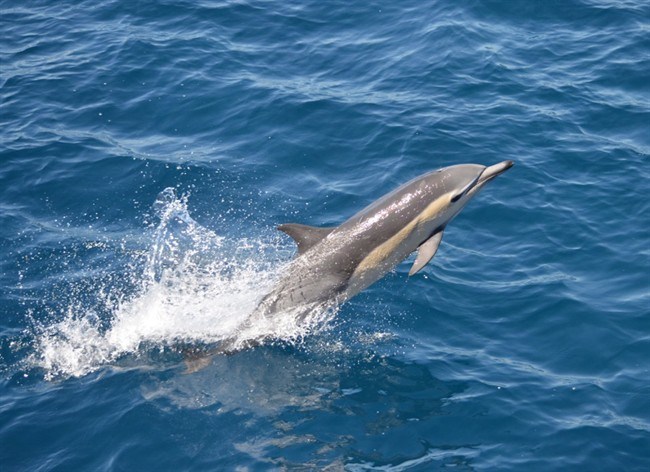The rare sighting of a dolphin species in the Salish Sea this week is a worrisome indication our oceans are getting warmer, a whale-watching organization says.
What is believed to be a group of short-beaked common dolphins was spotted Saturday morning by a whale-watching boat in the harbour of Port Angeles, Washington.
“It was a very interesting sighting in many ways,” said Michael Harris, from the Seattle-based Pacific Whale Watch Association. “But they don’t belong here. The water is supposed to be too cold.”
Common dolphins are rarely found north of California. They live in warmer waters and don’t usually migrate. They can grow up to eight feet in length and weigh up to 450 pounds. Harris said they are believed to be the fastest marine mammal, swimming up to 65 kilometres an hour.
Harris said this was the first time, to his knowledge, short-beaked common dolphins have been seen alive in the Puget Sound area.
“They looked like they were chasing fish, foraging,” he said, adding while the sighting is good for whale watchers, it is also an indication the planet has changed.
“We have giant algae blooms and ocean temperatures are rising,” Harris said, citing climate change as a major concern.
He said there have been several rare sightings over the past few years: a surge of humpback whales, massive schools of Pacific white-sided dolphins, an endangered northern right whale and an enormous fin whale.
A Risso’s dolphin, which can be found in both temperate and tropical waters, but is rarely seen off B.C., was found dead on a beach on Graham Island, part of Haida Gwaii, in February.
A Guadalupe fur seal, native to the waters off Mexico, and a green sea turtle were found on the west coast of Vancouver Island, and several tropical fish — including butterfish, finescale triggerfish and tuna — have been spotted in B.C. waters.
John Ford, a federal fisheries scientist at the Pacific Biological Station in Nanaimo, said short-beaked common dolphins were also spotted near Vancouver Island last September, when two groups were observed near Swiftsure Bank, at the mouth of Juan de Fuca Strait.
Ford said there are three records of short-beaked dolphins turning up dead on B.C. shores over the past 60 years. The first was in 1953, when a dolphin was found along Dallas Road with a belly full of partially digested herring.
The second was found on the west coast of Vancouver Island in Nuchatlitz Inlet in November 1994. A dolphin skull was found on Haida Gwaii in July 2011.
Ford said the recent sightings of the dolphins could be attributed in part to the slow general warming of the ocean associated with climate change. But two shorter-term ocean warming events are more likely to have contributed, he said.
“We have El Niño and the so-called blob,” Ford said, referring to the warm weather pattern and large expanse water in the northern Pacific that is about three to five degrees warmer than normal.
Scientists have linked the mysterious 2015 deaths of more than two dozen whales off the coast of B.C. and Alaska with a toxic algae bloom associated with the blob.



